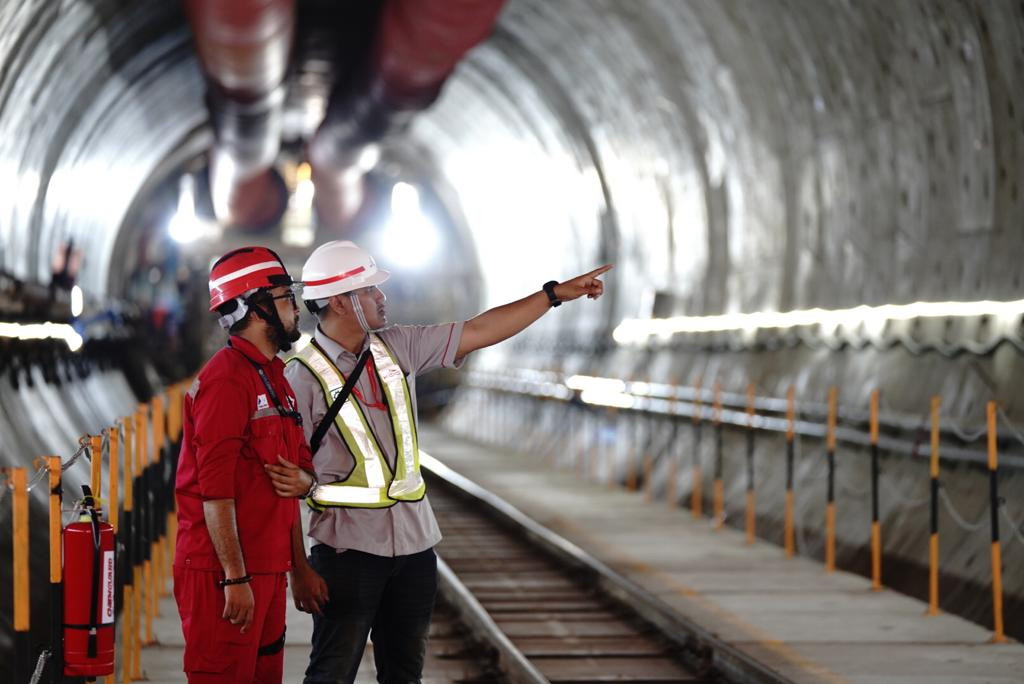Popular Reads
Top Results
Can't find what you're looking for?
View all search resultsPopular Reads
Top Results
Can't find what you're looking for?
View all search resultsHigh-speed rail project gets new chief after hitting buffers
KCIC is banking on its new president director, Dwiyana Slamet Riyadi, considered somewhat of a "Renaissance man" in railway services, to speed up the problem-addled Jakarta-Bandung high-speed railway project toward a 2022 completion date.
Change text size
Gift Premium Articles
to Anyone
P
T Kereta Cepat Indonesia China (KCIC), the consortium responsible for the Jakarta-Bandung high-speed railway project, has appointed as its new president director Dwiyana Slamet Riyadi, a well-known figure in Indonesia’s railway services sector who has a solid track record with state-owned train operator PT Kereta Api Indonesia (KAI).
Prior to his new appointment, Dwiyana was the acting president director of PT Reksa Multi Usaha (RMU), a KAI subsidiary that provides onboard catering services. He was also president director of KAI’s property arm, and before that, the operations and marketing director of KAI’s logistics arm.
Dwiyana replaces Chandra Dwiputra, whose three-year term has ended and will be appointed as a director at KCIC.
“The change was made by a shareholders’ decision. This also aligns with the start of the pre-operational step in which [project] operation and maintenance readiness is the priority issue. That is why [the shareholders] have appointed a new president director who has extensive background with PT KAI,” KCIC corporate secretary Mirza Soraya said in a press statement on Monday.
Mirza said that Dwiyana was expected to accelerate the Jakarta-Bandung high-speed railway project, which was scheduled to finish by 2022. She added that the project was 70 percent complete to date.
Read also: Progress on Jakarta-Bandung railway reaches 64%, with drilling of fifth tunnel
The project has been beset by several problems including an oil pipe accident and land acquisition problems, as well as COVID-19 restrictions, that delayed it from starting operations early last year as planned.
A source close to the issue told Tempo magazine that the project needed additional funding of US$1.39 billion, an increase of around 23 percent from its initial budget of $6.07 billion. According to the source, the budget shortfall was the result of an inaccurate feasibility study that had not included potential delays in land acquisition and price hikes in construction materials.
Land acquisition has been the project’s Achilles heel, with KCIC acquiring only 53 percent of the land it needed for the railway project by 2019.
Ferry Sofwan Arif, who heads the West Java Development Planning Board (Bappeda), has said that 99.7 percent of the 140-kilometer stretch of project land had been cleared as of March 23, according to Tempo.
Last year, the Public Works and Housing Ministry demanded that the project be halted for two weeks, citing the project’s poor drainage system that was blamed for flooding the nearby Jakarta-Cikampek toll road and causing traffic congestion.
Read also: SOE Ministry demands assessment of halted high-speed railway project
Meanwhile, Darmaningtyas of the Transportation Studies Institute (Instran) said the swelling budget was “not normal, but understandable”, due to the various problems that KCIC had to deal with that led to inevitable delays.
“The government is now aiming for the project to be completed in 2022, but further delay is possible. I think land acquisition problems have had the greatest impact on the project budget and timeline,” Darmaningtyas told The Jakarta Post on Wednesday.
“Hopefully, the new president director can accelerate [project] completion, as he has extensive experience working at PT KAI,” he added.
The Jakarta-Bandung high-speed railway project is one of the government's national strategic projects in the transportation sector. Once it is complete, the train service is to travel at speeds of up to 350 km per hour and cut down travel time between Jakarta and Bandung to 45 minutes, compared to the current service’s approximately 3 hours.










